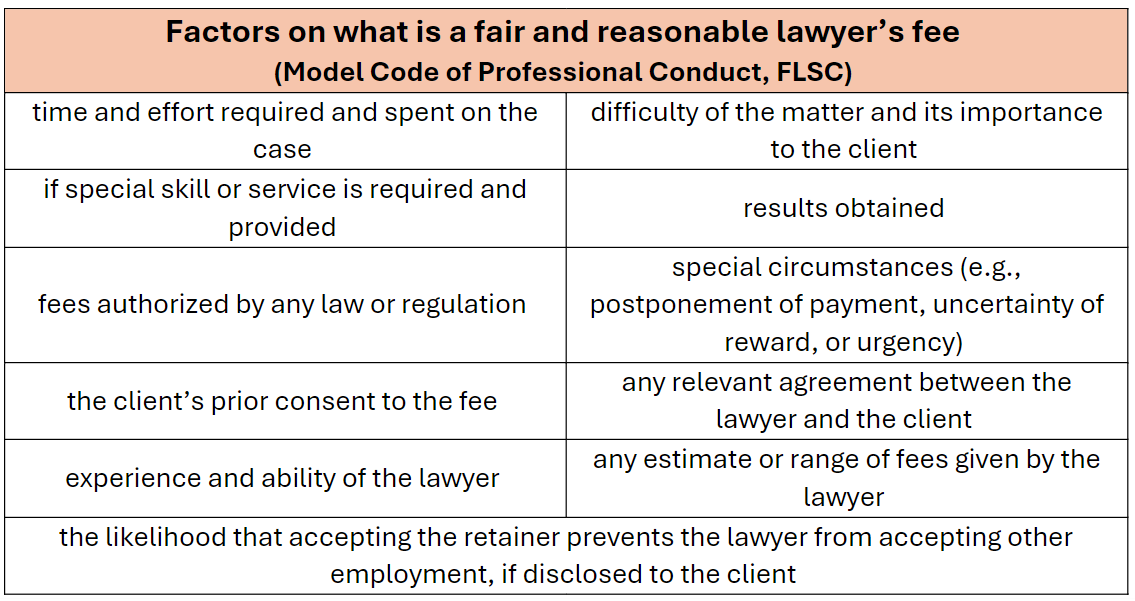
Curious about how a lawyer gets paid in Canada? Learn more about the different payment methods, their pros and cons, and other legal considerations

Discussing how does a lawyer gets paid can sometimes be a touchy subject because of some concerns about how it should be properly done. However, knowing about these methods and their legal implications is a great help for every lawyer.
In this article, we’ll answer the question “how does a lawyer get paid?” Aside from lawyers, this article can also be used by law students who are wondering about the ways to collect legal fees from their future clients.
There are four common arrangements on how a lawyer gets paid in Canada:
We’ll discuss these arrangements below; you can also watch this video to know more about these fee arrangements:
Learn more about the country’s legal education institutions through our comprehensive list of Canadian law schools.
The most common method to measure how much you’ll be paid by your client is hourly billing. Here, your legal fees are charged at an hourly rate against the total time you’ve spent on a client’s case (called the billable hours). This includes the case buildup, until it reaches the court, and a decision is rendered, such as:
The hourly rate usually depends on your skill, experience, and expertise on the matter. Other factors include location and the length of time you’ve been called to the bar.
This is used in most civil cases and litigations. It’s also used in instances when you cannot estimate in advance the exact time you’ll need to prepare a client’s case, among other tasks. It’s also used for shorter legal consultations and when the client is not yet sure whether to retain you or not.
When done properly, using billable hours is an objective and concise way of measuring your legal fees for the services you’ve rendered. The scope of work can also be adjusted at any time, without affecting any pre-agreed fees.
Clients may be wary of this type of arrangement, because it may result in an open-ended cost for them. On your part, it may also be a struggle to monitor your hours, down to the last minute, without the appropriate tools. For this, you can use a practice management solution as proof of your billable hours.
Flat or fixed fees is another type of fee arrangement for paying lawyers which is true to its name. For every transaction and legal matter, there’s a fixed or flat fee for that.
Some examples of transactions that use this type of fee arrangement are:
This method of paying lawyers can be compared to hourly rates, since flat fees are billed regardless of the hours you’ve worked on the task or case. Also, in flat fee arrangements, you have an idea how much time you’ll need to complete what your client asks you.
It’s typically used by clients when engaging a lawyer for a short period or for a one-time transaction.
Clients can choose what services they need and will pay for. On the other hand, you’re assured that you will be paid right away for the legal services you’ve done.
There’s this risk that when clients are not satisfied with the result, they will be asking for refunds or reimbursements of the flat or fixed fees they’ve paid. One solution is to rationalize the fees by percentage (e.g., half of the fees are for finishing the legal document, and the other half is for closing the deal).
A contingency fee is a type of arrangement where a lawyer is only paid:
Before you take on their case, you and the client must agree on a certain percentage or fixed amount. The condition is that you’ll only get it if you can win their case or when a settlement is reached because of your efforts. In other words, your legal fees are dependent (or contingent, hence the name) on you winning your client’s case.
Aside from your legal fees, you and your client can also agree on recovering certain costs and disbursements from the award or settlement made in their favour. Alternatively, it can also be agreed whether these costs and disbursements can be recovered, regardless of the result of the case.
This type of fee arrangement is common to personal injury cases, product liability cases, and class actions, where a part of the settlement or court award is given to you as your legal fees.
Your client would not have to pay legal fees upfront, or continually pay monthly fees, when you agree to represent them. Since a case may take longer to be resolved, they’re also not burdened with any continuing fees.
A risk on your part as a lawyer is that you may not be paid for any legal services rendered if you lose the case. Although it’s different from the perspective of the client, since they won’t have to pay for anything.
To know more about contingency fee arrangements in the context of disability claims cases, watch this video below:
Check our article on what lawyers make the most money in Canada to find out which legal practice area earns more.
To protect your and your client’s interests, there are more stringent requirements when it comes to contingency fee arrangements as set by the law societies.
For instance, the Law Society of Ontario (LSO) prescribes the following requirements before you can enter into a contingency fee arrangement with your clients:
Retainer fees are considered as an advanced payment or a deposit for the legal services that you’ll do in the future for your client. In this method of paying lawyers, whenever your client needs something, you’ll send them the appropriate accounts, which will then be charged from the retainer you’re handling.
At the end of a specified period, or when the legal matter is resolved, you’ll have to return any remaining funds out of the retainer. If the client wants to, the retainer may also be renewed, where an additional amount will be deposited on it. The client may also be required to renew the retainer if the amount runs out before the legal matter has been resolved.
This type of arrangement is good for clients who transact with their trusted lawyer regularly. It’s also for clients who anticipate many legal transactions in a given period (e.g., in a year) because of the nature of their profession.
On your part as a lawyer, you’re assured that any work you do for your client is paid immediately, and in full. As for your client, they can expect in advance how much they would need to get quality legal services from you.
Before the start of the retainer, computing how much should be deposited may be a challenge. Also, the cost of each transaction must be initially agreed upon or promptly disclosed to the client, to prevent any disputes.
Laws that govern the legal profession of each province or territory will have some provisions that are related to how a lawyer gets paid. In addition, the code of professional conduct of each law society will outline how lawyers can charge their clients.
We'll discuss some of these rules on lawyers’ compensation; to be sure, it’s also wise to specifically check with your law society’s codes of professional conduct.
The codes of professional conduct use the terms legal fees and disbursements regularly. There are differences between the two:
|
Legal fees |
Disbursements |
|
What the clients pay their lawyer in exchange for legal services; also called professional fees |
What the clients reimburse the lawyer for any expenses related to the case (e.g. filing fees, title search, courier charges) |
The distinction between the two is disregarded in some fee arrangements. For instance, in flat or fixed legal fees, the total amount may cover both the legal fees and the disbursements, which justifies the higher amount when fees are negotiated this way.
Of course, you’re allowed to charge your clients for any legal fees and disbursements. However, the amount must be fair, reasonable, and has been promptly disclosed to the client.
This is according to the Model Code of Professional Conduct (the Model Code). All codes by provincial and territorial law societies are also patterned after this Model Code, which is drafted by the Federation of Law Societies of Canada (FLSC).
These standards have been fairly adopted by most law societies, since there are no standard lawyers’ fees. It also means that fees must be contractually agreed upon by both you and your client.
That is why there are forms, such as retainer letters, to help you document all agreements with your client. The document must also be regularly updated whenever there are changes to your agreement.
The codes of professional conduct have provided some factors on what it means for a lawyer’s fee to be fair and reasonable. Below is what the Model Code of the FLSC provides as to what is considered fair and reasonable:

These factors are always relevant, especially when you’re negotiating an agreement with your client, or when enforcing the agreement on them. But how these factors play out depends on each case and client.
Here are some of the regular prohibitions when it comes to lawyers’ compensations:
To recap: how does a lawyer get paid in Canada? There are four ways:
Each of these methods has its own legal implications which you must consider for a flawless relationship with your client.
Knowing these can also help you avoid any potential administrative sanctions. Whether we like it or not, conversations on money can be awkward at first, but there’s no other solution but to discuss them head on.
Bookmark our legal education and law schools page for more resources on how a lawyer gets paid and other topics.